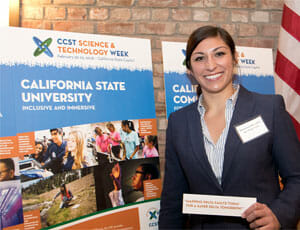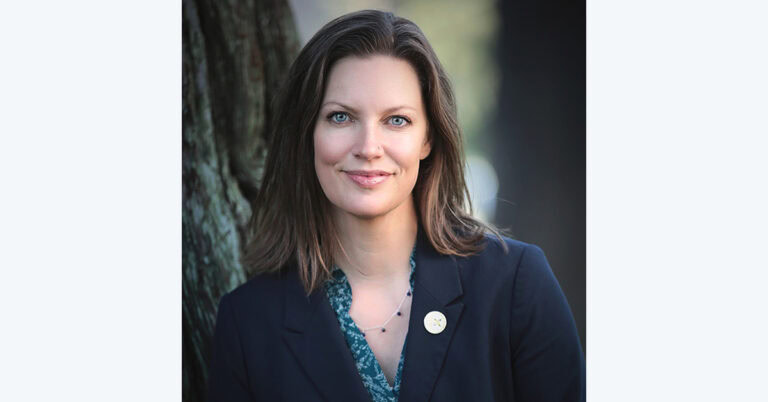Deputy Director
CCST Hosts Graduate and Postdoc “Science Translators” for Capitol Showcase
May 4, 2018 | CCST Newsroom | Contact: Ben Landis

SACRAMENTO, Calif. – Students are the future source of California’s research competitiveness and policy advice – and student scientists from CCST’s Sustaining Institutions were front and center during CCST S&T Week.
As part of its new “California Science Translators Showcase” program, CCST invited 15 talented graduate students and postdoctoral researchers from UC, Cal State, Caltech, and Stanford campuses to practice a crucial skill: translating science for policymakers. The event format intentionally breaks from academic tradition: instead of presenting large posters or lengthy slideshows packed with dense jargon, these 15 young scientists were simply armed with their flair for conversation and their budding talent for communicating science.
“There is great demand for science advice in California – which means we need to train more scientists in the art of clear communication,” say CCST Executive Director Susan Hackwood, PhD. “We created the Science Translators Showcase to give early-career scientists more opportunities to practice explaining their research to a policy audience – and to highlight some really cool science directly relevant to state issues.”
Many in this inaugural class of CCST Science Translators were presenting at the Capitol Building for the first time in their career, and their areas of expertise spanned timely topics such as earthquake safety, wildfire management, water supply and quality, and public health. Candidates had to submit audition videos in which they explained the relevance of their research in less than 60 seconds. The 15 invited presenters then underwent training webinars and other exercises to prepare for the networking event – a key assignment being the creation of an “ad slogan” explaining their research.
The February 20th event was organized in partnership with Assemblymember Jose Medina (D-Riverside), Chair of the Assembly Committee on Higher Education.
“California makes discoveries and decisions that shape the rest of the world. That’s because we have the best higher education institutions and the best scientists,” said Assemblymember Medina, whose presence and remarks kicked off the February 20th event. “This CCST Showcase is a great training opportunity for California’s student researchers. We need more scientists who can communicate clearly and better share their expertise with leaders in Sacramento. When scientists and policymakers can understand one another and work together, we can do great things for California.”
Shortly before the Showcase event, Assemblymember Mark Stone (D-Monterey Bay) and Senator Bob Wieckowski (D-Fremont) made floor remarks in their respective chambers to recognize the 15 CCST Science Translators. Assemblymember Stone focused his remarks on one of his constituents – participant Sarah Beganskas – who also had a chance to brief Mr. Stone about her doctoral research at UC Santa Cruz in his Capitol office. Senator Wieckowski also made an appearance at the Showcase, along with some 60 members of the Capitol community representing nearly 20 legislative and agency offices and advocacy organizations, as well as regional leaders from the Governor’s GO-Biz iHub program.
The CCST Science Translators were perhaps most surprised by the appearance of Caltech Nobel Laureates Kip Thorne and Barry Barish, who toured the showcase as part of their State Capitol visit that day. Both scientists took time to meet and speak with each of the CCST Science Translators.
“It was really helpful to learn about the State Legislature and to experience a one-day event there, versus a year-long program,” said CCST Science Translator Shannon Klotsko PhD, who is a postdoctoral researcher at San Diego State University. “It was a great intro into that world and being able to practice translating my science for use in policy.”
The 2018 CCST California Science Translators:
 Sarah Beganskas | PhD Candidate, UC Santa Cruz
Sarah Beganskas | PhD Candidate, UC Santa Cruz
Sarah explained strategies to replenish California’s limited groundwater supplies.
 Danny Broberg | PhD Student, UC Berkeley
Danny Broberg | PhD Student, UC Berkeley
Danny explained why “point defect physics” are important for tech development.
 Kenny Buyco | PhD Candidate, Caltech
Kenny Buyco | PhD Candidate, Caltech
Kenny explained how we can improve seismic retrofit ratings for buildings.
 Sonya Chalaka | Masters Student, UC San Francisco
Sonya Chalaka | Masters Student, UC San Francisco
Sonya explained the relationship between adverse childhood experiences and asthma risk, and the importance of clinical prevention.
 Joe Charbonnet | PhD Candidate, UC Berkeley
Joe Charbonnet | PhD Candidate, UC Berkeley
Joe explained how new materials can help harness stormwater for municipal use.
 Rylie Ellison | PhD Student, UC Davis
Rylie Ellison | PhD Student, UC Davis
Rylie explained innovations in treating dairy manure to meet clean air and water goals.
 Patricia Gonzales | PhD Student, Stanford
Patricia Gonzales | PhD Student, Stanford
Patricia explained the potential for creating regional markets to expand water supplies in California.
 Negin Hayatbini | PhD Candidate, UC Irvine
Negin Hayatbini | PhD Candidate, UC Irvine
Negin explained how extreme weather forecasting can help managers anticipate hydropower reliability.
 Anne Hulsey | PhD Student, Stanford
Anne Hulsey | PhD Student, Stanford
Anne explained strategies for cities to manage damaged buildings and optimize post-earthquake recovery.
 Shannon Klotsko | Postdoctoral Researcher, San Diego State University
Shannon Klotsko | Postdoctoral Researcher, San Diego State University
Shannon explained how she is mapping geologic faults that run through the Sacramento-San Joaquin Delta.
 Aaron Nichols | Postdoctoral Researcher, Caltech
Aaron Nichols | Postdoctoral Researcher, Caltech
Aaron explained how nicotine interacts with human cells, and our understanding of addiction.
 Gabriel Pratt | PhD Student, UC San Diego
Gabriel Pratt | PhD Student, UC San Diego
Gabriel will explain how we can eliminate “bad recipes” when analyzing genetic code when prospecting for biomedical cures.
 Drew Story | PhD Student, UC Riverside
Drew Story | PhD Student, UC Riverside
Gabriel explained how we can eliminate “bad recipes” when analyzing genetic code when prospecting for biomedical cures.
 Jennifer Tribble | PhD Student, UCLA
Jennifer Tribble | PhD Student, UCLA
Jenn explained why we need to understand the neurobiology of PTSD.
 Carmen Tubbesing | PhD Student, UC Berkeley
Carmen Tubbesing | PhD Student, UC Berkeley
Carmen explained current thinking in fire ecology and habitat management for wildfire risk.
About the California Council on Science and Technology
The California Council on Science and Technology is a nonpartisan, nonprofit organization established via the California State Legislature in 1988. CCST engages leading experts in science and technology to advise state policymakers – ensuring that California policy is strengthened and informed by scientific knowledge, research, and innovation.




